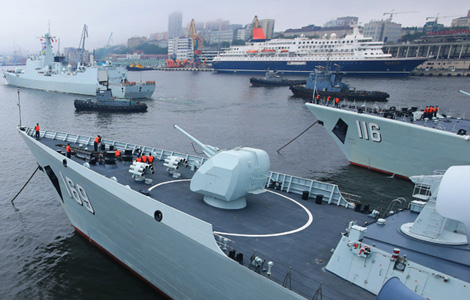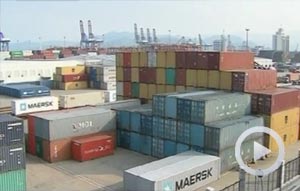China, US have much to work for
Updated: 2013-07-09 07:10
By Jiang Jianjian (China Daily)
|
||||||||
According to Horizon Research Consultancy Group surveys on Sino-US relations over the past decade, Chinese people basically recognize that the United States is an advanced society and civilization, and offers a high-quality life. They have also shown relatively high interest in American culture, and dating or marrying Americans.
Emotionally, Chinese people's favorable attitude toward the US since 2006 has been above the 50 percent level, which is roughly the same that Americans have toward China.
Economically, Chinese people see the US as China's most important partner, and an important tourist destination, commodity supplier and source of multinational management experience. So we can assume the favorable attitude of both peoples toward each other can ensure the continuity of the basic pattern of Sino-US relations. The only question is: Will there be more competition or more cooperation?
In terms of overall cooperation, however, there is a great cognitive difference in public opinion in the two countries, which is difficult to overcome in the short term. The Chinese pay more attention to politics in international relations, such as US arms sales to Taiwan, the Tibet issue, human rights, the Diaoyu Islands dispute and other issues, because Washington's political actions have a major influence (40 percent) in shaping their views toward the US.
Although Chinese people have to learn to adapt to China's great power status as the country faces increasing criticism and is viewed with greater suspicion, they are still strongly conscious about protecting their history and interests. Therefore, any attempt by the US to provoke Chinese people over major political issues will backfire.
The Barack Obama administration's strategic rebalancing to the Asia-Pacific region since 2011 broke the decade-old relative calm in the region. And though the US has repeatedly said it has no intention of containing China, many of its diplomatic and military actions have made Chinese people feel threatened.
Chinese people recognize that their government is investing more energy in international affairs, which is important to make them feel like citizens of a powerful nation. But China's efforts to widen its global influence will clash with the US' ambitions. For example, differences between China and the US over issues such as the Korean Peninsula, the Iranian nuclear issue and environmental protection will continue to persist. Also, China's initiative to play a more active role in the Middle East peace process will become a source of concern for the US.
According to HRCG surveys in 2010 and 2011, Chinese people's primary impression of the US is one of "hegemonism and power politics" (21 percent and 26 percent). In fact, this concern has prompted the Chinese government to put its US-related political issues high on its priority list. For example, Beijing has been urging Washington to take a stand on the Sino-Japanese dispute over the Diaoyu Islands instead of holding an ambivalent position.
In contrast, survey results of US-based Pew Research and Gallup show that Americans are more concerned about economic issues, such as the impact of Sino-US trade ties on the American job market and their quality of life. It is thus likely for Americans to misunderstand why the US economy has been sluggish with a high jobless rate and resent the rise of China.
Chinese people, on the other hand, have begun to see Sino-US differences and economic frictions more rationally, and hope they would be resolved according to international rules to achieve win-win results. According to HRCG findings, nearly 40 percent of the Chinese respondents said they understand why the US imposed punitive tariffs on Chinese products.This is surprising development because until a few years ago almost every Chinese found them unacceptable.
With regard to China's rapid economic development, Chinese people believe that Sino-US relationship is far from a zero-sum game with 35.3 percent of the respondents saying the US will be the biggest beneficiary of China's economic rise. In contrast, according to a 2007 Pew Research survey, 45 percent Americans think China's economic rise is a bad sign compared with 41 percent who see it otherwise. The 2007 poll results are more anti-China than the one in 2005.
Fortunately, Chinese social elites play an important role in shaping people's opinion on Sino-US relations. According to HRCG findings, there is a big difference between how Chinese social elites and the general public view Sino-US relations. But social elites, who tend to be more rational in their approach and more concerned about economic issues, have an obvious influence on the public.
The cognitive differences between Chinese and American peoples have their roots in their cultural and psychological traditions. For example, Chinese people cherish their collectivist values while their American counterparts swear by individualism. These objective factors are difficult to change in the short term.
Therefore, to ensure that Sino-US cooperation moves forward steadily, the two peoples should first develop deeper mutual understanding through more people-to-people exchange programs. Besides, the two governments should try to curb their differences and jointly promote pragmatic cooperation in fields where they can enlarge their common interests.
If the differences increase or are left to fester, the trust built between Chinese and American peoples until now could be compromised. Sino-US relations cannot develop smoothly without mutual trust. Let us hope dialogues between the two sides can help remove these differences and improve mutual trust.
The author is vice-general manager of the Horizon Research Consultancy Group.
(China Daily 07/09/2013 page9)
Most Viewed
Editor's Picks

|

|

|

|

|

|
Today's Top News
Air crash victims' parents leave for US
Ex-rail chief sentenced
Terror law called for after attack
Subsidies aid poor families
13 dead in Quebec train disaster
Premier Li lauds Guangxi's potential
Zhuhai's draft to establish new models
Mining firm confirmed to have polluted S China river
US Weekly

|

|














